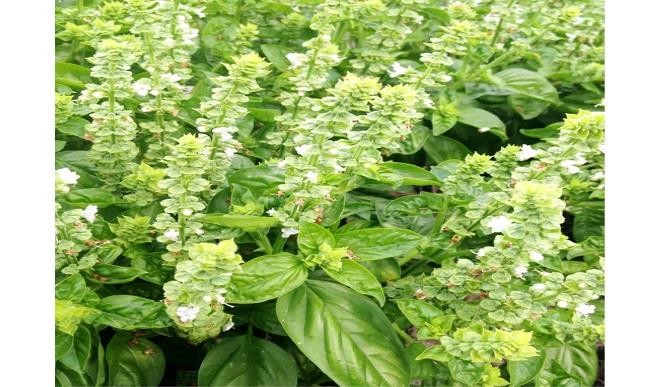
Botanical Name: Basil ocimum, Basil gratissimum;
Common Names: Sweet basil, Tea bush, Hairy basil, scent leaf; Yoruba – Effirin, Igbo – Nchanwu, Hausa – Dodoya, Benin – Asanifa, Efik – Amana
Description/Distribution:
Shrubs with many branches and grows up to 50 cm high. Found in gardens and farmlands. A very common spice, perennial leaves. Aromatic, produces white or pink flowers. Easily grown from seeds.
Germinates at 5-7 days, requires moist soil. Grows best in sunny location. Pruning every 2-3 weeks encourages bushy healthy plant. Could be dried on low setting in the microwave or place on screams in the shade.
Constituents:
Essential oils, thymol (high in African variety), methyl cinnamide, linalol, eugenol, tannins and glycosides. The leaves, flowers and essential oils are used.
Uses:
A very common cooking spice in soups and porridges, flavor soups, salads, tomato dishes, meat and fish. In India (Hindus use the leaves in the worship of gods and goddesses and partaken as Prasad of justice and universal order). It is used as an aromatherapy flower, used in cosmetics, liquors & perfumes.
Medicinal and Health Benefits
Antispasmodics, Anti-flatulent, Carminative. Used for treatment of headache, cough, depression, diarrhoea, fever, halitosis, kidney function.
It is also an insect repellant, used for throat and toothache, low blood pressure, fatigue, as an anti-bacterial (essential oil) and an anti-stress.
Health Tips:
One ounce of basil leaves + pint of water + 3 black peppercorns + a piece of ginger is good for fevers.
For digestion, constipation and flatulence 6-10 leaves and small piece of ginger = 6 cloves in 200ml of boiling water and taken 2-3 times daily.
Basil in pepper soup is good for colds and fever.
Basil + moringa oleifera is good for anemia. Basil + lemon juice + lemon grass + ginger + cloves produces a mixture excellent for malaria. Basil leaves + cloves boiled in milk promote sleep and reduces stress. Basil leaves + peppermint leaves + ginger + reduces cholesterol level and weight.

 Join Daily Trust WhatsApp Community For Quick Access To News and Happenings Around You.
Join Daily Trust WhatsApp Community For Quick Access To News and Happenings Around You.


